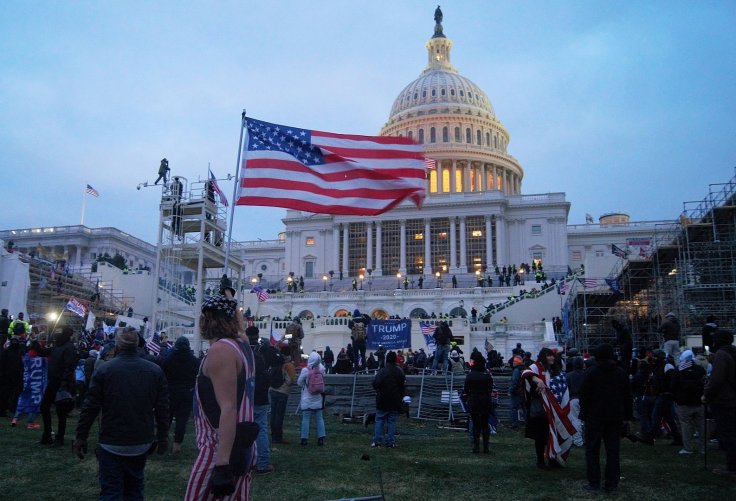Among the thousands of protesters, who attended the Washington Rally on January 6, a few were from the US military. Ashli Babbitt, who was shot dead by an officer in the Capitol building, was a US Air Force veteran. A retired Air Force lieutenant colonel Rendall Brock Jr, known as the 'Zip-Tie guy' was also charged by police for breaking into the Capitol. Now, another member of the US armed forces is under investigation for her role in the Capitol Hill protest that turned violent.
Emily Rainey, who is a psychological operations (PSYOPS) officer stationed at Fort Bragg, is under investigation by the US Army's 1st Special Forces Command. She led a group of 100 protesters from North Carolina to Washington on the day of the rally. Rainey, who is an active-duty officer, said none of the members of the group broke any law or entered the Capitol.
"I was a private citizen and doing everything right and within my rights," Rainey told the Associated Press. Rainey, who is a member of a group named Moore County Citizens for Freedom that supports President Donald Trump's claims of election fraud, said she went to Washington to "stand against election fraud" and support Trump. The 30-year-old officer added that all the members of her group boarded their busses before an emergency curfew was declared.

Major Daniel Lessard, a spokesperson for the 1st Special Forces Command, said Rainey was assigned to the 4th PSYOPS Division that specializes in spreading information and misinformation to control decision-making, emotions and actions of America's enemies. He also confirmed the ongoing investigation.
Can a Military Personnel Attend Political Rally?
This brings to the question of whether she was actually within her rights to attend a protest rally in favor of a political party while being an active officer in the Army. Rainey is right only if she did not break into the Capitol or enter an off-the-limits area or chant something that could be perceived as a threat. As per DoD Directive 1344.10, an active officer can express his/her personal opinion but not as a representative of the Armed Forces.
Participate in partisan political fundraising activities, rallies, conventions (including making speeches in the course thereof), management of campaigns, or debates, either on one's own behalf or on that of another, without respect to uniform or inference or appearance of official sponsorship, approval, or endorsement. Participation includes more than mere attendance as a spectator.

However, there are some issues. First, the directive is not clear. In subparagraph 4.1.2.1, the directive says an active member of the forces "shall not participate in partisan political activities including rallies". Active officers are prohibited from taking part in any partisan activity. But context matters.
If the officer is taking part in a protest or rally against a partisan bill (for example, against or for fracking), the individual is within the rights. But if the officer is attending a rally that promotes a political cause or a party, it is prohibited. Rainey was not in uniform while attending the rally in Washington but it is not clear whether she breached any of the DoD policies.
Rainey told AP that she attended the Capitol protest while on leave and her commanders did not inquire about her role in the Washington rally. "I told my bosses before I went that I was going, and I told them when I got back," Rainey said.
Past Encounters With Law Enforcement
While she hasn't been identified in any of the videos from the Capitol invasion yet, it's her past encounters with law enforcement that forced an investigation. In May, Rainey was charged with damage to property after she removed COVID-19 safety tags and let her kids play on Southern Pines park equipment. The park was closed due to COVID-19 safety precautions. Following that, she was banned from all the parks in Southern Pine for a year. The local police said she had done the same twice before and was let go with warnings.









